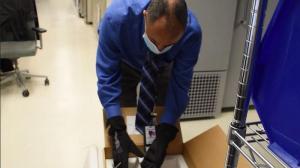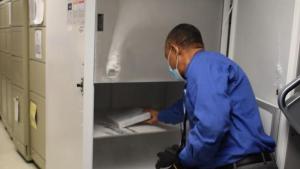Bayhealth’s Kent General Hospital was the first Delaware facility to receive a shipment of Pfizer’s COVID-19 vaccine Dec. 14, with more doses expected Dec. 16.
The Division of Public Health will begin scheduling delivery to the remainder of the state’s health systems upon receipt. If they are prepared, officials said, hospitals can then begin vaccinating staff within 24 hours.
“The Pfizer vaccine’s arrival is the first step in a process of getting back to our pre-pandemic normal,” said Gov. John Carney in a press release. “We are all looking forward to that. The vaccine will provide our frontline healthcare workers with the protection they need while caring for Delawareans who have contracted the virus.”
However, Carney said, the arrival of the vaccine in Delaware does not mean Delawareans should let their guard down. People need to continue to wear a mask and social distance to prevent the spread of the virus, he said.
DPH has devised a three-tier strategy for distribution as follows:
- Phase 1a: Healthcare personnel, emergency medical services agencies, and long-term care staff and residents will receive the vaccine first.
- Remainder of Phase 1: In early 2021, those who work in high-risk and critical infrastructure industries such as food processing, utilities, education, police and fire response; those who work and live in congregate settings such as correctional facilities and homeless shelters; and those who have certain underlying health conditions and are age 65 and older are likely to receive the vaccine.
- Phase 2: (March 2021) Those with more moderate risk for getting COVID-19 are eligible to receive the vaccine. More details about specific groups in this phase will be provided as rollout gets closer.
- Phase 3: (Spring/summer 2021) The general public can expect to receive vaccines through their primary healthcare providers, health centers and pharmacies as the vaccine becomes more widely available.
While DPH does not plan to mandate the vaccine, it is strongly encouraging that most people, particularly healthcare workers, get vaccinated once doses become available, officials said.
The Pfizer BioNTech COVID-19 vaccine was granted emergency use authorization by the U.S. Food & Drug Administration Dec. 11. The Centers for Disease Control and Prevention’s Advisory Committee on Immunization Practices voted the next day to recommend use of the vaccine for individuals 16 and older under the emergency use authorization.
The Pfizer vaccine does require two doses spaced about three weeks apart to be effective. The same brand of vaccine must be administered for both doses. DPH plans to remind individuals to get their second dose of the vaccine by sending reminder letters, providing automated phone calls and text messages, and using patient record cards.
Children under the age of 16 are not included in the initial three phases of the vaccine’s rollout, as the FDA has not yet approved its use for individuals in this category. More clinical trials involving children under 16 are still needed.
The FDA and the Centers for Disease Control and Prevention are advising that women who are breastfeeding, individuals who have experienced allergic reactions to other vaccines, and those who have compromised immune systems should discuss the benefits and risks of taking the vaccine with their medical provider before receiving it.
The potential side effects from the vaccine are similar to those experienced by people who receive the flu shot: soreness at the injection site, fever, headaches, and body aches that usually go away within 24 hours. Unless symptoms worsen or linger, there is no need to seek medical care. Pfizer reported no serious side effects from the vaccine, and there were no deaths directly linked to the vaccine itself. The FDA and CDC will continue to monitor the COVID-19 vaccine for safety and effectiveness, and any long-term or rare side effects.
The Pfizer vaccine has a 90 percent effectiveness rate. Comparatively, the flu vaccine is generally 40 to 60 percent effective. The COVID-19 vaccine does not contain a live virus and cannot give individuals the coronavirus.
DPH is in the process of setting up a Vaccine Call Center, which it expects to be operational soon. Individuals can email questions concerning the vaccine to Vaccine@Delaware.gov. Individuals can also visit de.gov/covidvaccine for up-to-date information. Myhealthycommunity.dhss.delaware.gov/ will also have data on the vaccine available soon.
Melissa Steele is a staff writer covering the state Legislature, government and police. Her newspaper career spans more than 30 years and includes working for the Delaware State News, Burlington County Times, The News Journal, Dover Post and Milford Beacon before coming to the Cape Gazette in 2012. Her work has received numerous awards, most notably a Pulitzer Prize-adjudicated investigative piece, and a runner-up for the MDDC James S. Keat Freedom of Information Award.














.JPG)








































